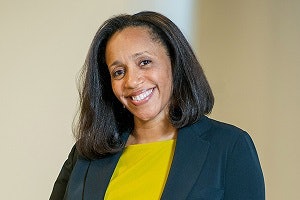While the landscape for developmental and remedial education can look discouraging, by being thoughtful and working together it can become more effective in narrowing educational disparities.
That was the sentiment from many of those who attended the Center for the Analysis of Postsecondary Readiness (CAPR) conference held in New York City last week.
“Examples of imagination and reimagination have changed the developmental reform landscape,” said Dr. Nikki Edgecombe, senior research scholar at the Community College Research Center (CCRC) at Teachers College.
This year’s conference theme, “Remedial Education Is Not Working for Many College Students. How Can We Do Better?” presented examples of what is working and what isn’t with the hope of attendees forging joint efforts to best serve students.
 Dr. Nikki Edgecombe
Dr. Nikki Edgecombe“We can and will do even better by sharing what we’re doing and learning not just with the reform-minded, but also with the many colleges still offering multi-course, multi-semester prerequisite developmental math, reading and writing courses,” said Edgecombe.
CAPR was founded in 2014 in response to the declining number of students completing college. At that time, nearly two-thirds of community college students and over 40% of students at public, four-year institutions were not graduating. Even today, thousands of students take developmental math and English classes, and for many of them, these courses are an obstacle to college completion.
“The work we’re doing in Massachusetts is around our newly announced equity agenda, which is focusing on addressing racial disparities in all contexts of post-secondary education,” said Dr. Elena Quiroz-Livanis, chief of staff and assistant commissioner for Academic Policy and Student Success at the Massachusetts Department of Higher Education.
Dr. René Cintrón, chief education and training officer with Louisiana’s Community & Technical Colleges, said Louisiana has eliminated the high school diploma as a requirement for entry into its institutions. She said that faculty and staff at the relevant institutions met over a period of time to develop policies and procedures so that eventually students would not need remedial coursework because they will have gateway courses that involve instruction and support.
“By the fall of 2022, all of our non-credit bearing conditional remedial courses will be phased out in favor of corequisite courses,” said Dr. José Luis Cruz, executive vice chancellor and university provost for the City University of New York (CUNY). He hopes CUNY will partner with other community college systems.
Quiroz-Livanis said there have been multiple working groups in Massachusetts so that faculty and administration don’t just buy into policies, but are integral in shaping them. Before fall 2018, the Massachusetts Department of Higher Education never shared institutional level data publicly. That has completely changed. This data will be shared and be part of the evaluation process of presidents at state institutions.
“We’re using data to see exactly how our public institutions are doing on a series of metrics,” she said. “We’re highlighting the racial disparities.”
In Louisiana, subgroups have tackled different areas of higher education around the state. Cintrón said it’s important students are guided to the right gateway courses, so time and money aren’t wasted.
“Eventually, we’re dealing with supplemental instruction, so there’s no more developmental stigma,” he said. Although the programming is not there yet, Cintrón envisions a time in the near future where students have a clear path of courses along with available resources to be successful.
During a panel session, Edgecombe asked Cruz what the barriers are to reform.
“You’re up against structural and cultural barriers that need to be very systematically dealt with,” he said. “It take a village when you want to take it to scale.”
Michael Collins, vice president of Jobs for the Future, said he’s seen positive results from student success centers. A challenge comes with funding new programs because funders tend to invest in very specific programs. It’s important, he said, that educators work together across institutions to produce compelling data and innovative ideas.
The panelists agreed one-size-fits-all solutions aren’t working. Cruz said data provides information, but transformation requires investment.
Steven R. Hinds, senior curriculum and professional developer for mathematics in the Office of Academic Affairs at CUNY gave a presentation titled, “Improving Math Teaching & Learning for the Underprepared Students.”
 Dr. José Luis Cruz
Dr. José Luis CruzHinds said adult education is terribly funded and students don’t get the amount of instruction they need in order to make the necessary gains. It’s hard to attract instructors with strong math content knowledge because these are often part-time jobs with no benefits, he said. There is a lot of high stakes testing—mostly for the programs, rather than the students—so states can pit programs against each other, he added. Recent high school graduates who come to community colleges underprepared in math face similar situations.
“The focus of my work is trying to figure out how we can teach better and more conceptually and focus on reasoning and mathematically thinking more broadly rather than just executing procedures,” he said.
The key, he noted, is to focus on concepts and reasoning—not only in remedial courses, but also in all community college math courses.
“My visions on how we can do better is to draw on people who know a lot about pedagogy and curriculum,” Hinds said. “We need to be involved in collective projects. If we want to change teachers, we need intensive experiences for them. We need them in classrooms watching really masterful teachers teach.”



















